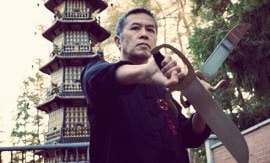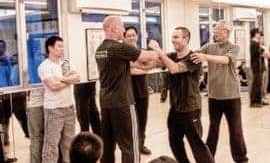
AS A YOUTH, SIFU LO MAN KAM SPENT MUCH OF HIS TIME LIVING WITH HIS UNCLE, THE LATE GRANDMASTER IP MAN, IN THE FOSHAN DISTRICT IN CANTON PROVINCE. WHEN HE WAS 18 YEARS OLD HE STARTED TO LEARN WING CHUN DIRECTLY FROM HIS UNCLE. LATER, AS A YOUNG MAN IN HONG KONG, HE WAS AMONG THE FIRST THREE STUDENTS OF GRANDMASTER IP MAN AND STUDIED THERE WITH HIM FOR MANY MORE YEARS.
Sifu Lo Man Kam established the first and only Wing Chun school in Taiwan back in 1974 and has helped spread Wing Chun throughout the world since. His school resembles a United Nations of Gung Fu, with students from 34 different countries and territories: including Switzerland, Germany, United States, France, Israel, Canada, Poland, Belgium, South Africa, Saudi Arabia, Turkey, Thailand, Hong Kong and many others.
At over 80 years of age, he still progresses further in Wing Chun, continually seeking to expand an already profound understanding of his art.
Sifu, you learned from your uncle Grandmaster Ip Man in Hong Kong during the 1950s. What can you tell us about that time?
Nowadays, many people talk about Ip Man without ever having seen him actually teach the art. Sometimes I wonder how they can say so certainly that my uncle was a very good teacher, without ever having trained with him. People can’t have a real feeling for his lessons or for his Chi Sao because they never even touched him.
Tsui Sheung Ting and I are among the last living students from the early years who did Chi Sao with Ip Man himself. I’m not talking about special techniques that he showed to the students, I’m talking about doing Chi Sao with him for a long time. It is important that a teacher gives his feeling to the students by training personally with them—to feel the mistakes and subsequently help them to correct those mistakes.
Wing Chun has no secrets—to fight and win is the only “secret”. Many people talk about hidden secrets that they learned from Ip Man—this isn’t true whatsoever because my uncle didn’t keep any secrets. He talked about the art and taught his students as best as he could. Some learned really fast, others were slower, but he didn’t keep any secrets from his students.
Ip Man said that Gung Fu is a dead object—only your body can bring it to life so that it becomes an art. I liken that phrase to when you give people an empty sheet of paper and they start to draw a picture. You create your Gung Fu from the things you have learned from your Sifu, but everybody will go on to use it in a different way.
The ability to mix and use what you have learned is the only “secret” to being a good Wing Chun practitioner. Also, you need a good knowledge of distance, timing, and technique to make it remotely functional. You can’t just copy the action—you must find your own way.
Sifu, you are over 80 years old now. Do you think Wing Chun helps you to stay healthy?
Absolutely! I think if you learn Wing Chun and you do your exercises every single day it helps you to stay flexible and more importantly, healthy. It is crucial that you do it daily. I train with my students every day.
Over the years your organisation has expanded and you have students all around the world. Why do you think your Wing Chun has become more and more popular?
My students teach Wing Chun the same way they learned it in my school. They teach the forms and techniques to their student and then let them learn to mix the things together, to finally create a functional Wing Chun. They pass on their own feeling, and in turn, help the students to improve.
There is a traditional way to teach the techniques of Wing Chun. You typically have to learn certain things before you can move on to learn the next technique. Like when you learn the empty-hand forms, you learn them in a traditional way, one after another, in a set pattern. First Siu Lim Tao, then Cham Kiu, Biu Tze, and finally the Wooden Dummy form. After the empty-hand forms; you learn the Long Pole and the Butterfly knives.
I teach my students the exact same way that my uncle Ip Man taught me. My students teach the exact same way in their schools. Some students are rather quick learners, others need more time to pick up the techniques, but the teacher takes care of them all regardless. We try to help the students create their own flow so that they can use what we teach them more effectively. I think that’s one of the main reasons why people join our schools. If we don’t teach that way, Wing Chun will be gone in perhaps 40 or 50 years.
If people just copy actions, over time they lose their feeling. Without feeling the art will simply die. Look at Confucius and his students. His students wrote a lot of good books, but they never copied from the master. He taught them the “feeling” to do that, but their behaviour is inherently different, but it is the same ideology—that’s the same when you learn Gung Fu. You have to open up your mind. Some students pick up the empty-hand techniques very easily, others will with the weapons. The teacher has to help them to improve so they can use their own feeling.
Every teacher has both good and bad students, or do you think all of Ip Man’s students were good because he was a famous teacher? This is why I remain in close contact with my students. I also visit them in their countries too. I have travelled to Europe for more than twenty years. I visit the German Association every year, as well as Switzerland, Hungary, France and the United States. We are a big community and are always in touch with each other, which is very important.
Also, the fact that our community is growing bigger isn’t because of popularity—it’s due to quality. Not all of my students will open a school, but those who do are fully encouraged by me to do so. The main idea of a school is to pass on the knowledge, not to generate more income.
How do you see the future of Wing Chun?
It’s not important which lineage you learn, but it is important that you can make the Gung Fu functional. Every teacher who can pass that on to you is a good teacher. A good Sifu does not only pass on the Gung Fu knowledge, he also passes on wisdom. He must not always look for more money—he should be a holder of the knowledge and should look for a plethora of talented students who can help spread the art to the next generation.
Some people say a professional Sifu has to charge a lot of money for his lessons because Wing Chun is his livelihood. A university professor is also a professional who passes on his wisdom and knowledge, and he earns a generous salary for doing so. However, he will never become rich from teaching! A good student can learn from him without paying any extra money. I have seen students learn a long, long time from a Sifu, but they didn’t have feeling nor skills. That’s very wrong in my eyes.
Some teachers keep secrets and don’t want to pass on their full knowledge because they only use Wing Chun as a means of making money. In our organisation, we try to do it another way, and we know many others who think the same way and who are just as open-minded and want to keep the art alive.



















